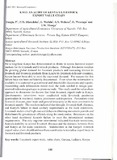An audit of Kenya's livestock export value chain

View/
Date
2011-09Author
Manga, T. W.
Wesonga, H.
Wekesa, S.N.
Wafula, E.
Ithondeka, P. M.
Irungu, P.
Language
enMetadata
Show full item recordAbstract
For a long time Kenya has demonstrated its desire to access lucrative export
markets for its livestock and livestock products. Although this desire matches
the growing global demand for livestock products and increasing interest in
livestock and livestock products from Kenya by livestock deficient countries,
Kenya has not been able to meet the expressed demand. The reasons for this
failure have not been sufficiently documented. Even when the information is
available it is scattered in government and stakeholder documents and reports.
Assembling such information would avail the tools needed to design goaloriented
redressive packages to promote trade. This study used the value chain
approach to document the factors that limit livestock export trade in Kenya.
Questionnaire interviews were conducted with livestock producers
(pastoralists & ranchers), traders, processors and importers. Pastoralists cited
livestock diseases, poor roads and general insecurity as the main constraints to
livestock supply. The ranchers indicated that drought, livestock theft, diseases,
and Kenya's failure to meet sanitary requirements as the main constraints.
Livestock traders cited high cost and delays in obtaining movement permits and
disturbance by government officials along the stock routes. Processors on the
other hand mentioned Kenya's failure to meet the international sanitary
requirements. The only importer interviewed indicated that trade restrictions,
Kenya's inability to control livestock diseases and the distance between them
and Kenya as the main constraints. Stakeholders in the Kenya's livestock
export value chain should address these constraints to revitalize export trade in
livestock and livestock products.
Citation
Optimimization of Agricultural Value Chains for sustainable DevelopmentSponsorhip
National Council of Science and Technology, The Kenya Seed CompanyPublisher
Faculty of Agriculture, University of Nairobi
Description
aGRO 2011 Biennial Conference presentation
